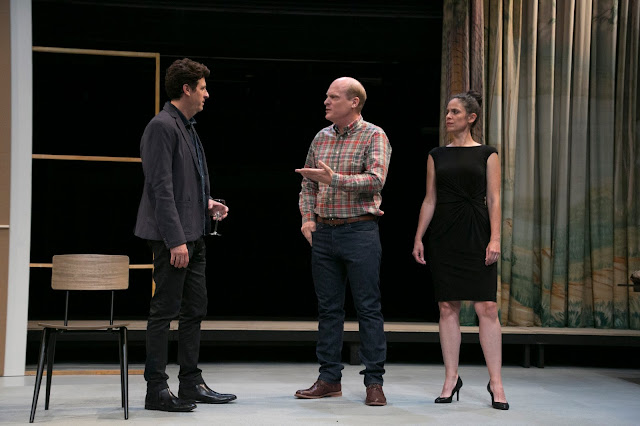"A Maxwell House Play--Decaffeinated"
 |
| Stars range from 5-1. |

The first
sign I knew I wasn’t in sync with playwright-director Richard Maxwell’s highly
lauded ISOLDE—shown briefly last year at the Abrons Arts Center and now at Brooklyn’s Polonsky Shakespeare Center—was my failure
to find funny the seemingly innocuous lines stirring tentative chuckles in
several people near me as well as throughout the theatre. This continued,
occasionally varied with more robust bursts of laughter on lines I found easier
to appreciate if not to laugh at myself. I realized soon enough that Mr.
Maxwell, considered by some to be one of America’s most gifted experimental
dramatists, was simply operating on a wavelength into which I wasn’t tuned.
 |
| From left: Gary Wilmes, Jim Fletcher. Photo: Gerry Goodstein. |
 |
| From left: Gary Wilmes, Jim Fletcher, Tory Vazquez. Photo: Gerry Goodstein. |
The actors
retain a fundamental realism in speech and behavior, although now and then displaying
modicums of passion (including a vivid sex scene and a mock duel with
swords); there’s a dispassionate air to them, as if they’re deliberately
holding in their feelings. This rather dry, pause-filled style sometimes reaps rewards when, because
of the contrast between content and delivery, certain lines resound more sharply
than they might otherwise. The dialogue itself is mainly realistic, and there
are several eloquent ruminations on memory and love, but some passages are
decidedly elliptic and, on the page, incomprehensible. The combination of realism and aloofness must be difficult
to sustain, but the actors do it admirably, maintaining their concentration and
thereby implying, if not demonstrating, a deeper level of emotion than may be apparent on the surface.
Over the course of an intermissionless hour and 25 minutes, however, the exercise
grows thin, and I was thankful to be rescued from growing sleepiness, if only
briefly, by the more notably theatricalist shift taken toward the end.
ISOLDE is
about a late 40ish couple, the title character (Tory Vazquez, Mr. Maxwell’s
wife), a famous actress and her husband, Patrick (Jim Fletcher), a successful
contractor. Although they already own several homes (and four cars), Isolde
envisions an ecologically advanced dream house on a lake near where she and
Patrick are presently living. Isolde’s memory is slipping (we watch her
struggle to learn her lines to a new play) and she may be in the early stages
of dementia; Patrick, hoping it will be therapeutic, indulges Isolde in her
project. She engages a dashing, award-winning, published architect, Massimo
(Gary Wilmes). He, however, given to theoretical bloviating, and clueless about guy things like sports and wine, produces only a sketch of his ideas. This brings him into conflict with the practical-minded Patrick, who detects
impracticalities in the project and needs to see plans, blueprints, and a
budget. His skepticism is matched by that of a relative, Uncle Jerry (Brian
Mendes), also in the home-building business, and desirous of landing the architect’s
contract. Meanwhile, Massimo is more concerned with conducting an affair with
Isolde than satisfying her husband’s demands.
After Patrick decides to fire
Massimo, the play shifts stylistic gears to present a mimed tab
version of a Tristan and Isolde play, apparently the one with whose lines Isolde has been struggling and which she still can't master. Some of Wagner's music can be heard in the background. The actors wear medieval costumes and the set is altered by the opening
of an upstage curtain painted with a rustic glade. The action then returns to a scene between
Jerry and Massimo before coming to an ambiguous end.
For most
of the play, the action transpires in a minimalist set (designed by Sascha van Riel)
representing Isolde and Patrick’s ostensibly luxurious home as merely a
collection of partial, unadorned wall units, the supporting timber for one
clearly visible so as to emphasize its artificiality. Furnishings are represented
by stackable chairs, a modern leather love seat, and a drink
trolley. There’s surely a symbolic relationship between the incomplete home we
see, the troubled marriage of its residents, and the “perfect” home Massimo has
been hired to design, but, honestly, when ISOLDE ended, I really didn’t care
one way or the other and wanted only to return to my own imperfect home for a cup of Maxwell House--the caffeinated kind.
ISOLDE
Theatre
for a New Audience/Polonsky Shakespeare Center
262
Ashland Place, Brooklyn
Through
September 27





